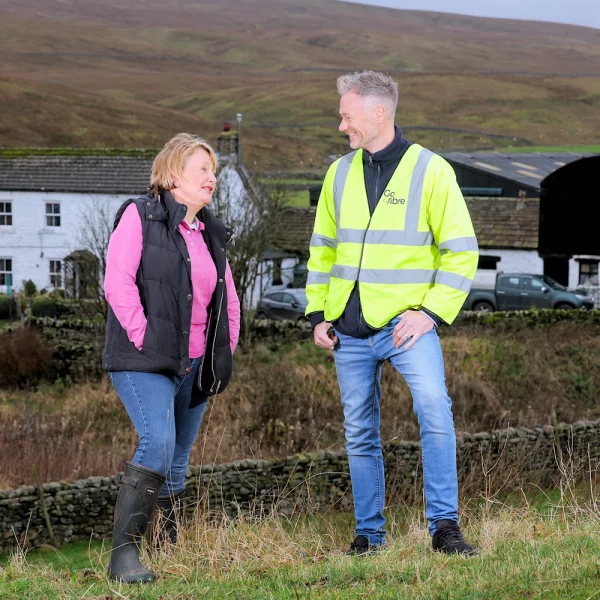GoFibre Complete Project Gigabit Broadband Rollout Contract for Teesdale UK

Edinburgh-based UK alternative network GoFibre, which is rolling out a gigabit broadband (FTTP) network across remote rural parts of Scotland and Northern England, has today announced that they’ve completed a second publicly funded contract – worth £7m – under the government’s Project Gigabit scheme for Teesdale (Lot 4.01 in County Durham).
The original Type A (Local Supplier) deployment contract for Teesdale was first announced all the way back in late September 2022 (here), which committed GoFibre to build their Fibre-to-the-Premises (FTTP) broadband network to reach slightly more than 4,000 premises over the following four years.
Since then around 8,100 homes and businesses, including 4,400 funded by the aforementioned contract, can now access gigabit‑capable broadband via GoFibre. The work has upgraded digital connectivity for rural communities in and around Barnard Castle, Mickleton, West Auckland, Middleton‑in‑Teesdale and surrounding rural villages.
Advertisement
Over the course of the rollout, GoFibre has also expanded their full fibre connectivity to more than 80 local businesses and village halls. The overall build also involved the installation of more than 600km of fibre cable and complex engineering work within multiple Sites of Special Scientific Interest (SSSI) in Upper Teesdale.
The announcement marks the company’s second successful Project Gigabit completion in recent months – following their £7.3m North Northumberland build in August (here).
Neil Conaghan, CEO of GoFibre, said:
“For us at GoFibre, this isn’t just about faster broadband – it’s about making sure people in Teesdale have the same connectivity as people in bigger towns and cities. It means a family can stream without the screen freezing, a farmer can get the services they need online and a small business can reach customers miles away. Full fibre really does open doors, and the amount of interest we’ve had shows just how much people here have been waiting for it.”
As an independent broadband network and provider, this is another outstanding achievement in delivering on our Project Gigabit contracts. We’ll now focus on delivering our two other major projects in Scotland. My thanks go to the Durham and Teesdale communities, our partners and everyone who rolled up their sleeves to make this happen.”
Telecoms Minister, Liz Lloyd, said:
“Fast, reliable broadband connects people, helps businesses thrive and creates new opportunities. Through Project Gigabit we’re improving infrastructure across every corner of the UK, ensuring rural communities don’t get left behind in the digital age.
Connecting these hard-to-reach communities to future-proofed broadband is a huge milestone for Teesdale and exactly the kind of progress we need to kickstart the economy and renew our country.”
Customers of the service typically pay from £21 per month for speeds of 150Mbps (30Mbps upload) on a 24-month term with free installation and an included router, which rises to £29.95 for their top 1000Mbps (100Mbps upload) package. But this price will increase by £3 each December. Customers can also take advantage of up to £200 in Switching Credit if they need to leave their old ISP early.
The operator currently expects to deploy their new full fibre based broadband network to reach a footprint of 250,000 premises “in the next 3 years“ (i.e. around mid-2028) and they’re home to a total of 10,597 customers.
Advertisement
Mark is a professional technology writer, IT consultant and computer engineer from Dorset (England), he also founded ISPreview in 1999 and enjoys analysing the latest telecoms and broadband developments. Find me on X (Twitter), Mastodon, Facebook, BlueSky, Threads.net and Linkedin.
« Openreach Grapple with Remaining Users as First UK Exchanges to Close
Advertisement
Leave a Reply Cancel reply
Privacy Notice: Please note that news comments are anonymous, which means that we do NOT require you to enter any real personal details to post a message and display names can be almost anything you like (provided they do not contain offensive language or impersonate a real person's legal name). By clicking to submit a post you agree to storing your entries for comment content, display name, IP and email in our database, for as long as the post remains live.
Only the submitted name and comment will be displayed in public, while the rest will be kept private (we will never share this outside of ISPreview, regardless of whether the data is real or fake). This comment system uses submitted IP, email and website address data to spot abuse and spammers. All data is transferred via an encrypted (https secure) session.






















































GoFibre sure are burning through money as if they never need to pay it back. With 10593 customers each having an estimated ARPU of £20, that equates to recurring revenue of around £211,860 a month. That’s barely scratching the surface of their enormous salary bill each month let alone their overheads.
I think that’s where the subsidy’s helped out – they are the only fibre to cover my small hamlet in North Northumberland as Openreach have no plans at all to upgrade us
Well duh Gigabit Broadband contracts don’t have to be paid back, that’s the whole point. Well their might be some sort of claw back if they get really high levels of uptake (not seen the contracts but BDUK had them so plausible that they do) a which point they would likely be commercial viable anyway and they are a form of interest free loan. My experience is the pole servicing my property where I got 78/20Mbps VDSL speeds has had a ~30% take up rate in 16 months since going live.
Can’t wait for them to start here. Although the article says Edinburgh, they started life in Duns in the Scottish Borders. And irritatingly my village is next to Duns, and indeed our exchange area code is the Duns one. But we haven’t been blessed with GoFibre yet, though according to their site – they will survey us and get it to us by 2028 so fingers crossed….
I took out a contract (mid 2024) with GoFibre as they were intending to service Banrard Castle. Despite many promises, they eventually admitted that running fibre to the few houses on my side of the town was not worth their while and they would not be honouring their contract.
Now to wait for Openreach to lay FTTP…. at this rate, I will probably be in a casket by the time they get here.
Also blessed with mobile phone coverage, currently limited to 4G on a good day indoors….